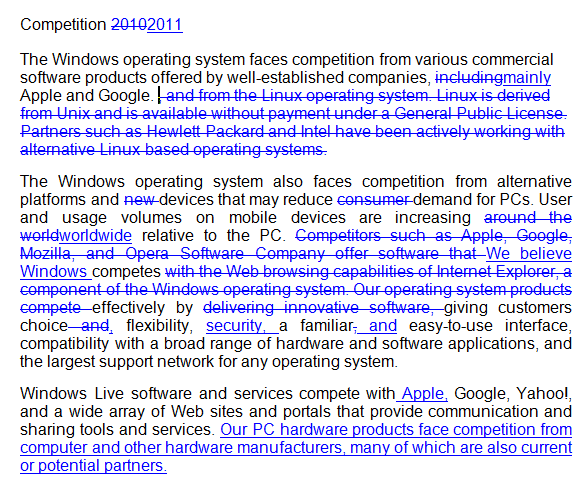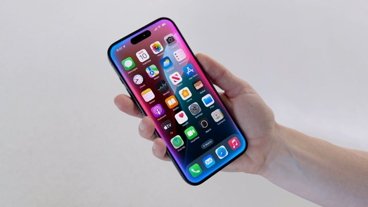Microsoft rewrites 10K filing to depict Apple as significant competitor
The new filing, detailed by Windows enthusiast Ed Bott of ZDNet, completely erases mention of the Linux operating system as a competitor to Windows.
Instead, the company now states that it is "mainly" Apple and Google who offer "various commercial software products that compete" with Windows. Last year, Microsoft cited various competitors "including" Apple and Google.
Microsoft has also changed its description of alternative platforms that compete against Windows, greatly deemphasizing the threat of web browsers that were once the company's top competitive priority. Even last year, the company listed Apple, Google, Mozilla and Opera as offering software that "competes with the web browsing capabilities of Internet Explorer," which the company described as "a component of the Windows operation system."
All of that verbiage is now gone, reflecting tremendous shifts that have occurred in the tech industry, both in the erosion of Internet Explorer's share of web use as well as in the shrinking role of PCs in general as people move to mobile devices.
World gone mobile
Microsoft doesn't mention smartphones or the iPad specifically, but does remove two key words that indicate how much mobile devices have changed its competitive landscape.
First, the removal of the word "new" before "devices" that compete with Windows indicates that Microsoft now sees mobile devices as being a mainstream phenomenon, rather than an approaching trend.
Secondly, the company struck the word "consumer" from its acknowledgment of the risk of reduced demand for PCs, indicating that mobile devices are now making great strides in the enterprise as well, not just within consumer markets.
Microsoft continues to note that "user and usage volumes on mobile devices are increasing worldwide relative to the PC," indicating that devices like the iPad, which can perform a variety of web and app functions, are far more of a significant threat to the company's business than alternative web browsers running on PCs.
Apple online services get a new mention
The company also added Apple in front of Google and Yahoo as competitors to its "Windows Live software and services," a remarkable shift given the general lack of respect the industry has accorded Apple's MobileMe services.
Microsoft is clearly recognizing Apple as a prominent supplier of online services, particularly as it moves to enhance cloud services to its growing audience of iPad and iPhone customers with the new iCloud, which will be available for free and by default for all users starting with iOS 5 later this fall.
Microsoft's own efforts in mobile devices, ranging from the Zune music player to the KIN and Windows Mobile/Windows Phone smartphone platforms and its tablet products based on both Windows CE and Windows 7 have all been dismal failures, resulting in the company's share of the smartphone market plummeting from 28 percent to less than 1 percent from the appearance of Apple's iPhone to the most recent quarter.
 Daniel Eran Dilger
Daniel Eran Dilger














 Amber Neely
Amber Neely
 Thomas Sibilly
Thomas Sibilly
 AppleInsider Staff
AppleInsider Staff
 William Gallagher
William Gallagher
 Malcolm Owen
Malcolm Owen
 Christine McKee
Christine McKee










36 Comments
should be a ego boost for Steve!
Mentioning Apple more prominently as a competitor may also be intended to address some suspicions that Microsoft and Apple are co-operating behind the scenes in tag-teaming Google and/or Android. It wouldn't serve MS well to be perceived as having an understanding with Apple on an Android strategy.
Mentioning Apple more prominently as a competitor may also be intended to address some suspicions that Microsoft and Apple are co-operating behind the scenes in tag-teaming Google and/or Android. It wouldn't serve MS well to be perceived as having an understanding with Apple on an Android strategy.
Nice take.
Mentioning Apple more prominently as a competitor may also be intended to address some suspicions that Microsoft and Apple are co-operating behind the scenes in tag-teaming Google and/or Android. It wouldn't serve MS well to be perceived as having an understanding with Apple on an Android strategy.
I kinda agree with you. google seems to be all domineering once you get on the WWW. i dont have a problem with it yet but its only a matter of time.
Hello buddies! I am sorry but I have to ask some tough questions. I noticed Steve Jobs was getting skinnier the last time I saw him. So I would like to know:
(a) Does Steve Jobs still have cancer?
(b) Is getting skinnier an ominous sign?
I am seriously worried after I read some comments on sites like 9to5mac.com. Hence, I'm very anxious to hear your thoughts on this. But I hope I'm just worried too much.
Thanks.IronTed